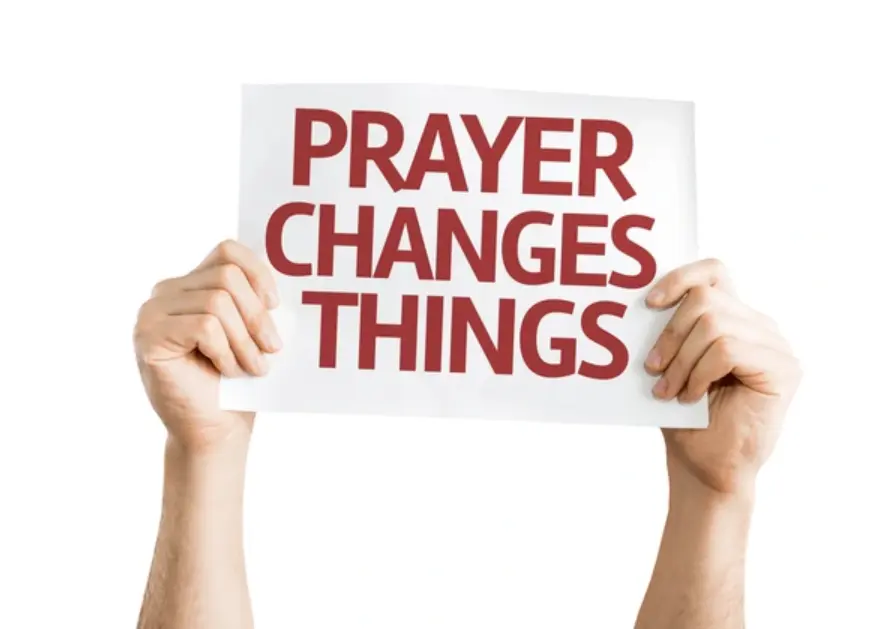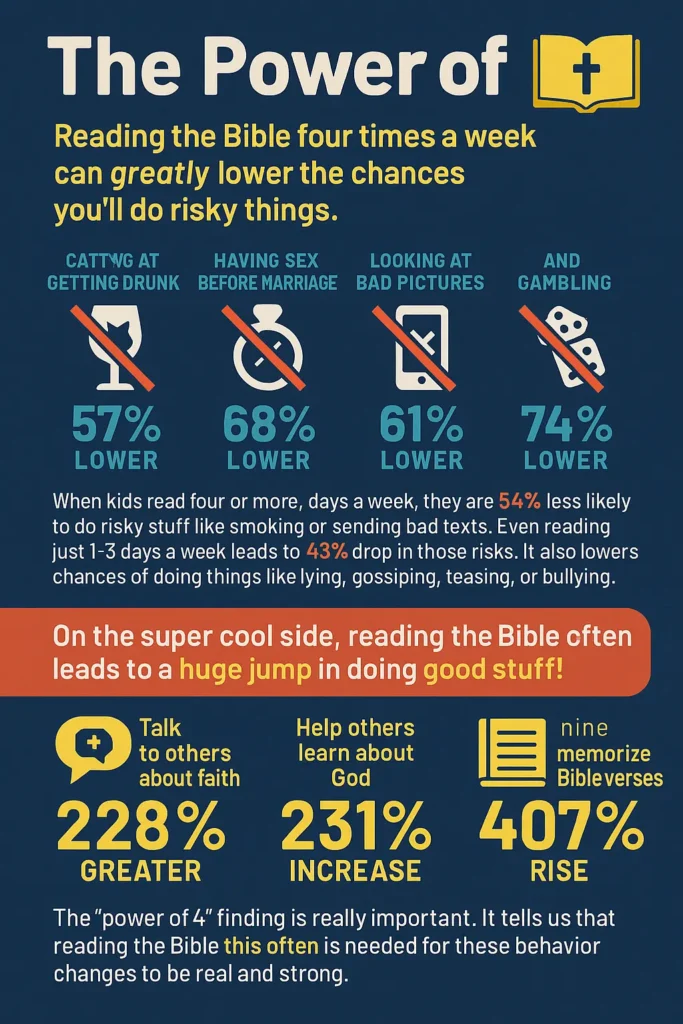Does reading the Bible really change a person? That’s such an important question! It’s all about how people grow inside, get closer to God, and make the world a nicer place. This report looks at this big question. It uses lots of smart research, real-life studies, and what church folks think. Groups like the American Bible Society believe something super special. For over two hundred whole years, they’ve worked super hard to get Bibles to everyone.
Table of Contents
ToggleTheir big goal is simple: They want every single person to feel its awesome, life-changing message. This shows a really strong trust in the Bible’s power to change lives for the better. This report wants to explain how this change happens and what it looks like, using real, solid proof.
Change from reading the Bible is way deeper than just learning facts about God. It’s big changes inside *you*! It’s building a stronger heart to handle tough stuff. It’s getting better at knowing right from wrong. It’s seeing God and life more clearly. It’s putting all those good rules into action every single day.
Every single piece works together for a whole new you – changing inside and shining outside! A big part is what people hope will happen when they read it. The American Bible Society says it right out loud: The Bible has the power to change lives and transform hearts.
This isn’t just a little thing people say; it’s a super important idea that makes lots of people smile! People looking for help from God usually hope to become better people. They hope to find help making choices. They hope to get answers to life’s really big, deep questions. This hope they already have, even if they don’t always think about it, is what gets people to start reading the Bible. And it’s what keeps them reading!
This shows that believing the Bible can change you makes a huge difference! It changes how you see change happening and how you feel about changing. Looking for change in the Bible creates a powerful, happy circle. The reader’s good thoughts and strong purpose make real, felt change way more likely. This interaction shows the bright, lively link between believing, hoping, and what actually happens. It might help us understand why different people feel different kinds of changes.
What Does Reading the Bible Do for You
Reading the Bible can help you in many ways! It’s like a life guide that supports you in hard times and cheers for the good ones. Reading the Bible brings comfort and inspiration, like a warm hug and gentle words of encouragement. It’s like having a smart friend who understands what you need to hear, even when you’re unsure or mixed up.

Pic credit: Shutterstock
The Bible provides you with purpose and guidance. It’s like a guide for your life, pointing you in the right direction and keeping you on track. Open the Bible and sense the bond! It pulls you into a bigger world, where you meet others who share your values and beliefs, making you feel like you belong to something truly special. It’s discovering where you fit and feeling that you are part of something bigger.
Reading the Bible helps you connect with God. Reading the Bible feels like having a direct chat with the creator of everything! Express your happiness and concerns, feeling understood in this open link. Open the Bible. Feel God’s hand guiding you. Discover peace and love like never before. He walks with you, bringing comfort and support along the way.
Now we explore the last 200 years of study & findings of what mankind got/ experienced through the Bible reading,so, stay tuned…
Influence on personal character & behavior
Here’s that Bible reading info rewritten just like you asked – super simple, happy words, all facts kept, in a natural USA voice:
Reading the Bible isn’t just about learning stuff. It’s really about hearing God talk to us! This awesome experience helps shape who we are and makes us want to follow Him. Michael DeFazio points out that to truly be changed by the Bible, you need a good heart and a willingness to obey.
These things are super important to really *get* the Bible’s big meaning, what it asks of us, and how deep it is. The Bible is meant for people who really think about the truth, talk about it, and live it out. Doing this helps us see the Bible’s amazing importance.
**This shows** a back-and-forth relationship: Starting to read the Bible builds a simple understanding and lights a spark inside wanting truth and goodness. This new wish starts building a better you inside.
Building that good character helps you be more open and ready to understand the Bible even better. That creates a happy circle of growing closer to God and changing how you act for the better! The Bible is way more than just words in a book. It is a special message from God Himself. To truly understand it, you gotta open your heart wide and be ready to grab hold of the truth and follow where it leads.
Looking at the people in the Bible helps believers learn big lessons from their lives. By paying close attention to these Bible folks – what they were like, their special qualities, and how they walked with God – people can see examples of good ways to act and bad ways to act. This helps them understand how to live as followers of God and use these lessons in their own lives. Changing on the inside because of God is seen as a trip where “Christ is formed in us.”
This journey helps us get better and better at understanding what God wants and doing it. **This process shows** the super strong power of the Gospel. It leads to growing habits that last, like showing love, having peace, and feeling joy from the Holy Spirit. A grown-up believer shows clear thinking, good values, and choices made by the Bible. They really, truly love God’s Word, accept that it’s the boss, and use its truths every day.
Studies tell us there’s a strong link between going to church or being religious and doing nice things for other people. Right? This includes sharing what you have, helping out, being kind, and caring about how others feel. Church groups often become busy places for helping the community. They raise money and people volunteer their time, helping spread kindness and support among everyone there.
One special study looking at people’s life stories found strong connections between caring about God-stuff and helping others, especially in people who showed they liked to help in lots of ways. Big ideas focused on how faith shapes who you are, getting more serious about believing over time, a clear link between what you believe and feeling you *should* help others, and finding real power to help in the life and sacrifice of Jesus.
This study suggests that personal faith actually grows from hanging out with others. People soak up what’s important from God from the people around them. They share these ideas using the same kind of words, which really affects how much they help others. **This shows** a lively circle: Hearing what the Bible teaches regularly helps people take in God’s values and shapes their faith identity, leading to personal change. This identity inside acts like a guide, helping a person choose to do helpful things and stay away from risky stuff all .
Surveys from the Center for Bible Engagement show that knowing the Bible and reading it helps guard you against doing things you shouldn’t. It is linked to doing *way* less risky stuff like looking at bad pictures or having mean thoughts. This protection stands strong all by itself, not needing much from other things like praying or going to church.
Reading the Bible four times a week can *greatly* lower the chances you’ll do risky things. Check this out:
Your chances of getting drunk are 57% lower! The chance of having sex before marriage is 68% lower. The risk of looking at bad pictures is 61% lower. And the chance of gambling is 74% lower! When kids read four or more days a week, they are 54% less likely to do risky stuff like smoking or sending bad texts.
Even reading just 1-3 days a week leads to a 43% drop in those risks. It also lowers chances of doing things like lying, gossiping, teasing, or bullying. On the super cool side, reading the Bible often leads to a *huge* jump in doing good stuff! There’s a 228% greater chance you’ll talk to others about your faith, a 231% increase in helping others learn about God, and a giant 407% rise in memorizing Bible verses!
The “power of 4” finding is really important. It tells us that reading the Bible *this often* is needed for these behavior changes to be real and strong.

Pic: Infographic by Readingszone
This shows that just reading a little bit or not very often might not be enough to really grab hold of these good values and show them in what you do. How often we read seems to play a key part in turning simple facts into strong beliefs that change how we act.
Here’s a happy fact from Harvard T.H. Chan School of Public Health: Teens who often went to church or prayed/meditated daily were 29% more likely to help out in their towns when they grew up!
Table 2: Impact of Frequent Bible Engagement on Behavior (The “Power of 4”)
| Behavior Category | Engagement Frequency (4+ days/week) | Impact on Odds (vs. less/none) | Source |
| Risky Behaviors | |||
| Getting Drunk | 4+ days/week | 57% lower odds | 9 |
| Sex Outside Marriage | 4+ days/week | 68% lower odds | 9 |
| Pornography | 4+ days/week | 61% lower odds | 9 |
| Gambling | 4+ days/week | 74% lower odds | 9 |
| Smoking | 4+ days/week (children) | 54% lower odds | 11 |
| Sexting | 4+ days/week (children) | 54% lower odds | 11 |
| Destructive Thoughts | 4+ days/week (children) | Lower rate | 11 |
| Lying | 4+ days/week (children) | Lower rate | 11 |
| Gossiping | 4+ days/week (children) | Lower rate | 11 |
| Teasing/Bullying | 4+ days/week (children) | Lower rate | 11 |
| Prosocial Behaviors | |||
| Sharing Faith | 4+ days/week | 228% higher odds | 9 |
| Discipling Others | 4+ days/week | 231% higher odds | 9 |
| Memorizing Scripture | 4+ days/week | 407% higher odds | 9 |
| Volunteering | Weekly (adolescents) | 29% more likely | 12 |
Provide Emotional and Mental Clarity
The Bible is like a super helpful friend for healing and feeling new again! It can really help how we feel in our minds, our hearts, our spirits, and how we get along with others. This awesome help makes tough feelings easier, gives our minds a happy refresh, and builds stronger friendships with God and the people around us.
A really neat study by Baylor University and the American Bible Society showed something cool: Mixing good mental health ideas with reading the Bible helps people who have hard hurts inside. People in a special program called “Healing the Wounds of Trauma” felt much less deep sadness, worry, anger, and scary memories.
They also felt more forgiveness, and caring for others, and knew God had a plan for them. This program mixes the amazing wisdom of the Bible with smart ways to feel better mentally. People in jail often carry very deep hurts. Being in Bible-based groups for healing hurts led to clear, good drops in those scary memories (PTSD). They felt better emotionally, showing more forgiveness and caring. Many felt God’s plan for their lives much more strongly.
Dr. Byron R. Johnson, who helped write the study, said it worked amazingly well: “No other known help does so much good for jail friends with such deep hurts in such a short time!”
Reading the Bible often helps people handle big feelings and hard times much better. It lets them swap sad or worried thoughts for the true, happy things God says. This process, called “renewing of your mind” (Romans 12:2), is super important for changing and growing into your best you.
Studies also tell us that reading the Bible every single day can give a boost to something called dopamine. Dopamine is a happy brain chemical! It’s super important for our mood (feeling happy!), our get-up-and-go, remembering things, and learning. It also helps the paths in our brain for thinking and doing things, which might make us smarter and help us make better choices.
Surveys show that Americans who read the Bible often have way more hope than those who don’t. This is super clear for those who really dig into God’s Word. This hope sparkles with sticking-to-it-ness, not giving up, and a big push to do well! Lots of Bible verses give deep strength, hope, and peace that feels super safe. For example, Isaiah 40:31 promises fresh strength for people who trust in God. Philippians 4:6-7 tells us to tell God what we need, full of thankfulness, and find a peace that’s bigger than we can even understand!
“Renewing of the mind” (Romans 12:2) is a powerful, awesome idea. It goes way deeper than just knowing things in your head. It’s about real change in your spirit! It really affects how we see ourselves, learn to trust, and break down wrong ideas about who we are. This change gets super strong support from clear Bible teachings, doing things that help us understand God’s truth, and having loving friends around us who care.
A study looked at African American women and men. It found that using special Bible parts, like ones showing God as a Protector, a Giver of good things, or a Healer, helped them handle stress. This was super true during super tough times, like when a family member died or faced a really bad sickness.
Some research shows an important detail about how reading the Bible helps with stress. How much it helps can depend on what someone basically believes about the world. For church friends who believe the world is mostly bad, reading the Bible might actually make big life troubles feel more upsetting, instead of helping calm them down.
On the other hand, for people who don’t see the world as mostly evil, reading the Bible really does help ease their worries. This observation shows that how we understand the Bible and fit it into what we already believe is just as important as reading it. It’s not just what you read, but how you get it and fit it into your thoughts that shapes how it helps your mind feel.
This means that for some people, seeing evil and hurt everywhere can cause more struggle or sadness instead of bringing comfort. This finding highlights the super important role of having wise spiritual friends and teachers along with reading the Bible.
It makes sure that understanding the Bible builds you up strong and hopeful, not more worried. It shows us the Bible isn’t a one-size-fits-all magic fix for feelings – we need caring help that fits each person just right.
Also, explore the amazing ways of how to enjoy reading books.
Deepen your spiritual journey and bond with God
Reading the Bible regularly is like a super important habit for friends who love God! It helps us know Him better and makes our time with Him special. These good habits aren’t just chores we have to do. They help us reach a much bigger, awesome goal. The point of reading God’s Word isn’t just to finish it, but to connect with God Himself!

Pic credit: Shutterstock
Staying close to God’s Word is super key for growing up strong in your faith. Real growth in your spirit shows a deep, true love for the Bible, a happy heart ready to follow its advice, and a promise to live by what it teaches. This powerfully shapes how a person thinks, what they care about most, and the choices they make every day.
Lifeway Studies tell us something cool: Reading the Bible is the number one sign someone is growing spiritually. These studies also show that lots of people who go to church still find it hard to understand some basic things about God. **This points to** a gap between how grown *they feel* spiritually and what they actually understand deep down.
**This research showed a big gap between what people think is true and what is really true about spiritual growth. Only 3.5% of the people surveyed showed real growth over a whole year, while way more – over 55% – felt like they had grown spiritually. This also shows a big difference between our feelings and how we measure real spiritual growth. Thus,it shows that just reading the Bible or feeling good about it might not lead to actual, see-it-in-your-life change!
Truly growing spiritually needs more than just reading the words. It needs using what you learn, living out Bible truths every single day, and having help from friends at church who cheer you on and help you stay strong. **This brings up** an important question for smart people studying this and for church leaders: What kinds of Bible times work best – like reading slowly and thinking hard, studying to use it right away, talking about it with friends, or memorizing verses – to turn feeling grown-up into real spiritual muscle?
A 2024 study about Pentecostal pastors showed a surprising result: it found “no significant link between Bible reading and spiritual growth”. This study said that other things might be *more* important for how church leaders grow spiritually, telling us we need to look deeper into how all these good habits work together. **This shows** a deep idea: spiritual change is a wonderful mystery—it’s both normal (like how people grow taller) and super amazing (needing help from God’s Holy Spirit)!
Good habits like reading the Bible are seen as ways to get ready for God to change us, but they aren’t the only reason change happens. These habits can’t change us or make us closer to God all by themselves, but they can be life-changing *when God works right through them.
This view is key to understanding why just counting things in studies has limits. It shows that reading the Bible often is super important, but true heart change comes from the awesome power of the Holy Spirit. This clarifies confusing results, like that 2024 study on the pastors. It suggests that spiritual growth is shaped by lots of things, like God’s amazing grace, saying “Yes!” to Him with your whole heart, and your church family, not just reading alone. These shifts mean the focus from just doing things to the deeper wonder and God’s powerful touch in growing our spirits.
The Bible is seen as “God’s inspired message that shows His nature, His desires, His promises, and His love for us”. By reading and thinking about Scripture often, people can learn to see themselves and their life the way *He* sees them.
Christian bookmakers and church helpers highlight that reading Scripture helps people “understand it, grow spiritually, and live an inspired faith,” leading to “deeper closeness with God” and a “life full of purpose.”
The Bible is God’s clear letter telling us about Himself and everything He made. All through its many books, Scripture shows us God’s never-changing heart and character. These include His perfect goodness, rock-solid faithfulness, amazing kindness, and deep, deep love. Smart thinkers about God say that God shows Himself to people through special messages. This includes the God-inspired words found right in the Bible.
The Bible is called “God-breathed“ (2 Timothy 3:16-17). It is useful for teaching us what’s right, showing us when we’re wrong, and training us to do good. This message from God is more than just sharing facts. It actually changes how people think, guiding minds toward what’s good and helping us build better friendships with God and with each other. The Bible offers deep wisdom, super helpful guidance, and warm comfort. It acts like a steady rock for people facing life’s big waves and hard pushes.
Also, explore the ways to focus your reading books/gadget
Shape Moral Decision-Making and Ethics
The Bible is like a super clear map! It gives awesome advice for doing well with money, at work, in marriage, with faith, making friends, growing yourself, fixing arguments, and almost every single part of daily life.
This smart help is right there for anyone who looks for it with a heart ready to listen. Watermark Community Church shares “Biblical Principles For Decision Making.” This guide helps you use Bible teachings every single day, even when the Bible doesn’t talk straight about your exact situation. Here are the principles:
These principles include:
Table 3: Biblical Principles for Ethical Decision-Making
| Principle Number | Principle Name | Biblical Basis | Practical Application |
| 1 | Consulting Biblical Principles | Proverbs 2:6, Proverbs 3:5-6, 1 Corinthians 10:31 | Ask what the Bible says; Seek help from others for understanding; Ensure interpretation is supported by others. |
| 2 | Gathering Facts and Avoiding Haste | Proverbs 18:13, Proverbs 18:17, Proverbs 19:2, Proverbs 21:5 | Ask many questions; Avoid “wishful thinking”; Be wary of “once in a lifetime” deals; Refrain from premature decisions. |
| 3 | Examining Motives and Learning from Experience | Proverbs 16:2, Proverbs 20:9, Proverbs 26:11, Proverbs 17:10 | Acknowledge “blind spots”; Honestly evaluate motives; Allow others to provide input; Learn from past mistakes. |
| 4 | Seeking Collective Counsel and Heeding Warnings | Proverbs 11:14, Proverbs 18:1, Proverbs 18:2, Proverbs 10:17, Proverbs 16:25 | Seek collective wisdom; Distinguish sharing from selling ideas; Know when to invite more input; Do not assume you are the “exception.” |
| 5 | Considering Outcomes and Integrity | Proverbs 14:1, Proverbs 14:15, Proverbs 27:12, Proverbs 25:26, Proverbs 10:9, Proverbs 20:7, Proverbs 22:1 | Perform “long math” for consequences; Assess potential risks; Develop contingency plans; Ensure decisions do not jeopardize integrity or witness. |
| 6 | Seeking Kingdom Impact | Proverbs 11:30 | Consider how the decision contributes to God’s Kingdom; Do not assume difficulty means it’s not God’s will; Understand unique gifting for God’s purposes. |
The “10 Biblical Principles For Decision Making” show that the Bible gives really deep help for doing the right thing, way more than just a basic list of “dos and don’ts.” It includes a smart system that mixes looking inside yourself (like checking why you want to do something and learning from mistakes), getting help from outside (like gathering facts and asking friends), and thinking ahead (like guessing what might happen and how it affects others watching).
This method goes past stiff rules. It loves a bendy, principle-led way of thinking about right and wrong. It shows that the Bible’s effect on how we act isn’t just about making strict rules. It’s more about building a way of thinking and doing to find the best choice in really tricky and foggy spots. It cheers on deep thinking and understanding instead of just obeying rules.
This difference matters a whole lot when people say the Bible has parts that are “old-fashioned” or “unfair.” Thinking carefully about what the Bible means helps friends of God make a strong plan for doing good. This framework goes beyond just one time in history, making it less likely someone will use the Bible wrong to say bad actions are okay.
The Apostle Paul says that Scripture is “God-breathed” and can change lives! It gives knowledge and shapes the mind with truth and the right beliefs. It acts like a ruler for knowing wrong, a way to get back on track, and a teacher for growing over time.
The Bible is seen as a super special helper for money advice. It shares deep thoughts on making a spending plan (budgeting), taking good care of what God gives (stewardship), sharing happily (generosity), and handling money the right way.
Examples include warnings about how debt can be scary (Proverbs 22:7) and the need to put God first, way above money (Matthew 6:24). It pushes for a complete way of helping people. This goes way past just giving cash. It includes help for the spirit and body, like Peter showed when he helped a man walk (Acts 3:6). Bible teachings cheer on careful planning and budgeting (Luke 14:28) as super important steps for smart money adventures and saving for later.
Provide useful advice for everyday life
Using Bible teachings every single day can change your life and pull you closer to God! This includes three key parts: knowing and showing love, really going after the Kingdom of God, and growing the Fruit of the Spirit.
You can see it used in lots of ways! Love means being nice, caring, and helping. It’s all about treating folks how you want them to treat you, just like Jesus said: “Love your neighbor as yourself” (Matthew 22:39).
Big parts are forgiving others (Ephesians 4:32) and helping, as shown by Jesus washing His friends’ feet (John 13:14-15). To find God’s Kingdom, put what God wants first (Matthew 6:33) and make talking to God (prayer) and thinking about His words (meditation) a normal part of your day.
The Bible cheers us on: “Pray without stopping” (1 Thessalonians 5:17) and sees God’s Word as “a lamp for my feet and a light for my path” (Psalm 119:105) for help and wisdom.
Living right means using Bible ideas every day. It shines a light on honesty, caring deeply, and being humble (Philippians 2:4). Growing the Fruit of the Spirit means welcoming happy things like love and joy (1 John 4:16, Philippians 4:4), peace and patience (John 14:27, Colossians 3:12), plus kindness, goodness, and staying true (Ephesians 4:32, Proverbs 28:20).
Talking to God (prayer) is a key part of following holy teachings. It helps people ask for God’s super wisdom and help. This way, they can match their actions to what God wants and look for His support.
Bible study plans usually have clear steps for using what you learn. These steps include: Seeing (What is being said?), Understanding (What does it mean?), Connecting (What else is being said?), Doing (What will *I* do with this?), and Thinking Deeply (Thinking about the Bible and its teachings).
The inductive Bible study method zooms in on the “Doing” step: “How does the Bible relate to *my* life today?”. This means finding why the words matter *right now* and fitting their meaning into your own life. **This complete and connected way** of using things is what truly makes the deep, see-it changes happen that research and personal stories talk about.
Studying God’s Word regularly is super key for growing your spirit. The big problem of not knowing the Bible well is tackled, highlighting your promise to God’s Word as the “only true solution”. The neat “power of 4” research shows something important. Jumping into the Bible four times a week can lead to feeling happier inside, stronger friendships, and doing good things.
On the flip side, reading less often (just 1-3 days a week) shows little to no see-it-in-real-life change. This means that how well we get into Scripture matters way more for real change than just owning a Bible or reading it sometimes. It shows a clear link: the more you dive in, the bigger the good stuff you feel!
This insight is super important for church helpers, teachers, and anyone who wants the Bible to make a bigger difference. It cheers them on to go beyond just saying “read the Bible” and to help build real “Scripture engagement” with good plans and steady habits. It shows why some folks might not see big changes, even if they say they “read the Bible,” if they only touch it lightly.
Changing your spirit happens bit by bit. It grows with time and through hanging out with others. Doing good habits and practices helps us open up to God. Having friends in faith is super important. What Paul taught about changing is always about this. It is always seen with friends around—the body of Christ with all its different parts.
This encourages growing together and sparks love and good actions. Being with other believers is an important spiritual habit. It needs to stick with a local church and work to build real friendships. Groups for students help them grow their faith. They offer Bible studies and help the community. **This allows** students to live what they believe in real and powerful ways.
How do you start to read the Bible?
The Bible can change your life in many ways. How can you tap into its true power?

Pic credit: Shutterstock
3 Secrets to Unlocking the Bible’s Power:
Start small: Don’t feel pressured to read the whole thing at a time! Choose a short passage or a daily devotional that fits your schedule. Consistency is key!
Get active: Don’t just read passively. Think about what you’re reading, ask questions, and talk to others about it. Find a Bible study group or a mentor who can guide you.
Live it out!: Don’t just keep the words on the page. Put what you learn into action, like helping others or being kind to yourself.
Thoughts from Experts, Studies, and Personal Stories
Great news! Experts found that reading the Bible changes people’s lives. The American Bible Society has a cool report called the “State of the Bible”. Their newest report from 2025 shows things are looking up! More grown-ups in America are using the Bible now. It went up from 38% to 41%. That means a whole extra 10 million grown-ups read the Bible outside of the church at least three times a year! Wow!
Even better, people are diving deeper into the Bible! This growth is super exciting, especially for younger grown-ups called millennials. Their Bible use jumped up 29%! And 17% more of them are really getting into Scripture. Men are joining in more too! Their Bible use went up 19%, making the difference between men and women much smaller.
This is awesome because it turns around a drop we saw last year in the 2024 report. Lots of Americans, about 51%, really *want* to read the Bible more. This feeling is super strong in a group called the “Movable Middle”. A huge 80% of them see the Bible as a place to find wise help for their spirit.
Most Americans (56%) are curious about the Bible, or Jesus, or both! That’s neat! And get this – an amazing 92% of people who read the Bible at least three times a year say it changed their life. Guess what? Even 38% of folks who aren’t regular “Bible users” say they’ve had life changes too!
Why might that be? Maybe from going to church, or reading it before, or seeing how friends and family live. People called “Scripture engaged” show something special: 57% more “persevering hope” when times get tough. That’s strong hope that keeps going!
Table 1: Key Findings from American Bible Society’s “State of the Bible” Reports (2022-2025)
| Metric / Trend | 2022 Data | 2024 Data | 2025 Data | Source |
| Bible Users (3+ times/year outside church) | N/A | 38% | 41% (+10M adults) | 1 |
| Scripture Engaged (deeper interaction) | N/A | 11% (Gen Z), 12% (Millennials) | 15% (Gen Z), 17% (Millennials) | 1 |
| Bible Users Reporting “Life Transformed” | 92% | N/A | N/A | 56 |
| Non-Bible Users Reporting “Life Transformed” | 38% | N/A | N/A | 57 |
| Millennials Bible Use Increase | N/A | N/A | 29% increase (from 2024) | 1 |
| Men Bible Use Increase | N/A | N/A | 19% increase (from 2024) | 1 |
| Americans Wishing to Read More | N/A | N/A | 51% (80% of Movable Middle) | 1 |
| Curiosity about Bible/Jesus | N/A | N/A | 56% (82% of Movable Middle) | 1 |
| Digital Bible Access | N/A | N/A | 2/3 of Bible Users (62% use apps) | 1 |
Lifeway Research tells us something important: Reading the Bible regularly is the “best predictor of spiritual maturity”. Even though 82% of people who go to church believe the Bible is true, many find it hard to understand basic things. This research found a big gap.
Only 3.5% of people in the study showed real spiritual growth over a year. But guess what? Over 55% *thought* they had grown! More and more Americans see the Bible as “true”. This number grew from 36% in 2016 to 48% now. Many also believe it is “life-changing”, jumping from 35% to 45% in the same time. Forty-five percent! This shows a big difference: people see how great the Bible *could* be, but actually using it is harder. They run into problems like not making it important, being too busy, feeling it’s too big, or thinking it doesn’t matter to them.
This means churches and people need to think not just *about why* reading the Bible is good, but *how* to help others do it deeply and regularly, even with our busy lives today.
Here’s some super hopeful news! The Baylor University and American Bible Society Trauma Healing Study found something wonderful. Mixing mental health help with Bible reading gives great help to people hurting from hard times. One study with people in jail showed this. Joining Bible-based groups for healing trauma made their PTSD symptoms lower, helped their feelings get better, and made them feel God’s purpose in their lives more strongly. How cool is that?
Experts say that reading the Bible should be like really hearing God talk to you. You need an open heart, a real thirst for truth, and a readiness to do what you learn. Spiritual transformation is like Jesus’ character slowly growing inside you.
This journey is both natural, like how we grow up, and supernaturally special, needing the Holy Spirit’s active help. This change happens by regularly doing spiritual activities. The Bible shows us exactly who God is. It tells us He is holy, never changes, is faithful, is gracious, and is loving.
It also tells us His big, wonderful plans for people and the world. Thinking about faith needs a balanced way to grow. It should be grounded in the Holy Spirit’s work and how believers actively grab hold of God’s strength in their faith journey.
Real people’s stories back up the research(Previously mentioned table)! They show that studying and using God’s Word regularly brings real good things, a deeper faith, and a clearer sense of purpose in life. These stories often share how people beat their past troubles and feel like they have “endless triumph”!
Stories show how meeting the Bible can spark a strong wish for more Christian books, help people see Scripture as God’s direct message, and totally change their life’s path through the powerful work of the Holy Spirit.
People often say they just feel better in their minds and hearts when they read Scripture. It helps them find comfort and support during tough times with friends or personal worries. More and more people are using phones and computers! They use apps, Bible websites, and YouTube to connect with the Bible.
This shows that making it easy to get and using modern ways to share are key to reaching people today, especially younger groups like millennials and Gen Z, who are getting more involved. Significant data! This means that how we engage and the tools we use are very important.
They help people connect and interact regularly, leading to the positive changes we see. Churches need to change how they help people connect. They should use digital tools to help people dive deeper into Scripture and unlock its amazing power in today’s world.
Challenges and Critiques: Can the Bible Change You?
Even though there’s awesome proof the Bible changes lives, there are some tricky parts and questions people have. One big challenge is the really big “distance” between the Bible’s old world and us readers today. Think about gaps in time, place, language, and how people lived back then.
It’s been over 1,900 years since the last Bible words were written! Because so much time has passed, people today often miss important stuff about that ancient world and the spoken stories that shaped the Bible.
This distance makes it hard to understand old events and customs. Folks today often don’t get the meaning of different places. The Bible was written in Hebrew, Aramaic, and Hellenistic Greek. Most people can’t read those languages now. That means we usually need translations, and translations can explain the words in different ways.
Cultural distance shows that farming societies long ago, who told stories out loud and had different customs, beliefs, and values, can be tough for modern readers who use books and computers to understand. This gap can lead to mix-ups when we use today’s ideas on those very old words.
A big problem happens when people take the Bible too literally. Language needs understanding! For example, when Jesus talks about cutting off a hand for sin, he’s using big exaggeration. He doesn’t mean it literally!
The Bible was shaped by its own culture. What seemed plain and “literal” to someone in the ancient Middle East might feel totally different to someone in America today. Think about the picture language in Psalm 18:2. The Bible has lots of different kinds of writing! It has history stories, poems, prophecies, visions of the future, parables, and wise sayings. Each kind needs its own special way to understand it. Mixing up the kind of writing, like thinking wild symbolic visions are simple history facts, causes big confusion.
The writers of the New Testament didn’t always take the Old Testament at just face value. They often saw deeper meanings and fulfillments that went way beyond just the old story. Taking things too literally can lead to strange or even hurtful results.
This includes using old stories to support flat-earth ideas, snake-handling rituals, or twisting Bible words to defend slavery and super strict gender roles, while missing the bigger good lessons of Scripture. This shows how super important it is to read carefully and with the whole picture. We should think about what the first writer meant and how the first readers got it.
Also, people have questions about some Bible parts that seem mean or wrong by today’s rules. These include times when God is said to order or okay really sad things like wiping out whole groups, slavery, human sacrifice, rape, incest, killing babies, and unfair treatment of women. Some smart folks think that focusing only on words can create reasons for actions we see as bad today. They say Scripture shouldn’t be shown as a clear moral guide for everyone without lots of careful thinking and good judgment.
Three benefits of reading the Bible every day: In summary
1. Spiritual Growth: Reading the Bible daily can deepen your spiritual understanding and strengthen your relationship with God. It’s like nourishing your soul with the wisdom and love found within its pages.
2. Emotional Stability: The stories and teachings in the Bible can offer solace and peace amid life’s challenges. They remind us that we’re not alone and that there’s always hope, no matter how dark things may seem.
3. Moral Compass: By immersing yourself in the teachings of the Bible, you develop a solid moral compass that guides your actions and decisions. It helps you distinguish between right and wrong and encourages you to live a life of integrity and compassion.
Beyond Faith: The Science and Psychology of Transformation
Science can’t definitively measure the impact of spiritual experiences, but studies have shown connections between religious engagement and positive outcomes. Regular Bible reading has been linked to:
- Lower blood pressure and heart rate
- Reduced inflammation
- Stronger immune system response
- Increased feelings of purpose and meaning
- Improved coping mechanisms for dealing with stress and trauma
The reasons behind these benefits are complex but likely involve the psychological impact of the Bible. It can:
- Provide a sense of control: Knowing you’re part of something bigger than yourself can offer comfort and security in an uncertain world.
- Promote forgiveness and compassion: Biblical teachings encourage empathy and understanding, fostering healthier relationships.
- Offer hope and meaning: The Bible presents a narrative of purpose and redemption, helping individuals navigate life’s challenges.
But what about those seeking a deeper connection with the divine?
How to get closer to God?
Reading the Bible can help you get closer to God. It begins with seeking out a quiet area where you can be alone with your thoughts and open your heart to God’s presence. Imagine relaxing in a warm corner with your favorite book; only this one is full of stories and insights that speak straight to your soul.
As you open the Bible, pause to pray and ask God to communicate to you through its pages. It’s like sending a message to a close friend, knowing they’re listening and ready to answer. Then, start reading with an open mind and heart, letting the words seep in and resonate with you on a deep level. It’s like discovering long-hidden gems.
As you read, consider what you’ve learned and how it relates to your life. It’s like linking the stories and teachings of the Bible to your own experiences and difficulties. Take notes if necessary, jotting down ideas and insights as they occur to you. It’s like preserving cherished memories in a scrapbook for later reflection.
Finally, if you come across something you need help understanding, feel free to ask for help and clarification. It’s like asking a trustworthy mentor for counsel, knowing they’ll guide you through life’s intricacies. Above all, know that God is with you every step of the process, drawing you closer to Him with each word you read.
In the end, many studies show a link between reading the Bible and growing closer to God, but some research has different or more mixed-up views. A 2024 study on Pentecostal leaders found “no big link between Bible reading and spiritual growth” in that group. Surprise! This suggests other things might be more important for their spiritual journey.
This highlights how tricky spiritual growth can be and why we shouldn’t make Bible reading connected to personal change seem too simple. As we talked about before, reading scripture can help lower worry, but it depends on how a person sees the world.
If someone believes the world is mostly bad, reading might actually make them feel more upset instead of helping. This shows that how we see the Bible changes what we think and feel about it. This adds even more layers to its amazing power to change lives!
Last Few Words But not Least
Wow! All the evidence shows that spending time with the Bible can truly change you in many wonderful ways! It changes who you are inside, helps you feel better emotionally and mentally, helps you understand God more, and helps you make good choices. You can see these changes in how you think and how you act.
Studies keep finding that people who regularly read the Bible grow kinder, do more good things for others, and avoid risky stuff more. Remember that awesome “power of 4” finding? It shows that big changes happen when folks read the Bible at least four times a week. This proves how important it is to connect deeply and often, not just skim the surface.
The Bible is like a super helper for your feelings and thoughts! It gives comfort, fills you with hope, and helps you see things clearly, especially when you’re stressed or hurting. While Bible readers usually feel more hopeful, it can depend a bit on how you see life. As we talked about before, if someone thinks the world is mostly bad, it might affect how the Bible helps them.
Growing closer to God and understanding Him better is a huge result of regular Bible reading. It’s like a special exercise for your spirit! This amazing change happens because of both your effort and the Holy Spirit’s super-powerful help. It helps you grow spiritually and see God’s true character – that He is holy, faithful, gracious, loving, and has awesome plans!
But here’s a fun twist at the same time also.: Sometimes people believe they’ve made huge leaps in their faith, like they’ve grown super tall spiritually! But the actual change isn’t always as big as they think. Right! This cool fact shows us something super important: putting our learning into action and joining a group are the secret keys behind this true growth. It’s like both seeds and good soil to grow a strong plant!
Furthermore, the Bible offers us a great guide for recognizing right from evil in all spheres of life! It helps us sort things out at home, at school, during play, and anywhere else. It’s like having a smart buddy there by our side for each decision! It is not a set of guidelines only. It enables you to properly negotiate difficult circumstances so that you may be honest and really benefit your community. Even with all these incredible developments, understanding the Bible can be challenging occasionally-mind it, ok?
Why not? It’s very old! There are large divides in time, culture, and language from then to now. Reading the Bible too strictly can lead to issues, and some sections feel tough to accept with modern standards. We must be mindful and attentive readers, considering everything around us.
The Bible can change lives. There are facts to prove it! We showed it to you, Right? But, it needs action to happen. It’s an exciting journey!
Your change depends on your attitude, how often you read, how deeply you understand it, and the support from friends and family. For anyone who approaches the Bible with a desire to learn and an open heart, it becomes a powerful source of personal transformation and a fantastic guide for living a purposeful life!
Frequently Asked Questions
Q. How can reading the Bible improve my mental health?
Ans. Studies show reading the Bible, with its inspiring stories and wisdom, can help you feel better! It can ease stress and worry and even make you feel happier and healthier.
Q. Is it necessary to read the Bible every day to experience its benefits?
Deep diving into the Bible daily can unlock powerful connections, but even a quick flip through the pages can bring peace and lift your spirits!
Q. Can anyone benefit from reading the Bible, regardless of their religious beliefs?
Ans.Absolutely! The Bible’s timeless wisdom and inspiring stories connect with everyone, offering direction and meaning for your journey, no matter your beliefs.
Q. How can I make reading the Bible a habit?
Try setting aside a specific time each day for reading and study, and consider using a reading plan or devotional to help guide your daily practice.
Q. What if I don’t understand everything I read in the Bible?
That’s okay! The Bible can be challenging to understand at times, but the important thing is to keep reading and seeking understanding. You can also find study guides, commentaries, and other resources to help you dive deeper into the text.



